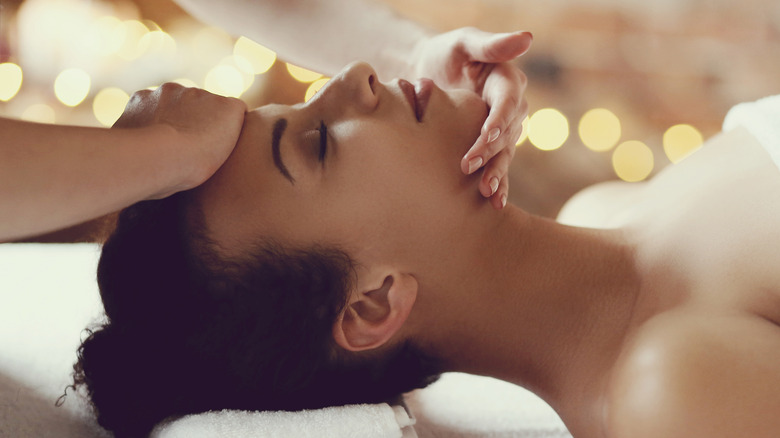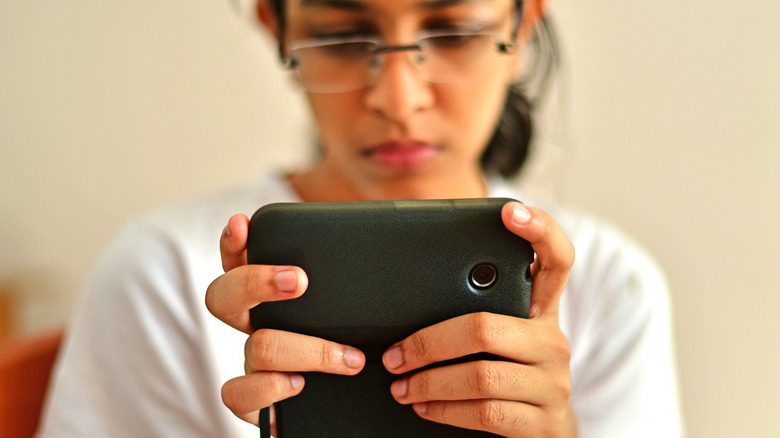Habits That Will Make You Happier
Happiness can sometimes feel like an out-of-reach emotion, especially if you don't like your job or are in an unhappy relationship. Even if your life is pretty good, you may find yourself wishing you could be happy more of the time. Luckily, there are many habits that will help you be happy every day. I went to the experts to learn which habits will make you the happiest.
Cultivate gratitude
Incorporating gratitude in your daily life will make you happier because you will learn to focus on the good things rather than the negatives. Therapist Kimberly Hershenson recommended, "Keep a daily gratitude list. List ten things you are grateful for, which can be anything from reality TV to your family."
Patti Sabla, life coach and licensed clinical social worker, added that when you intentionally focus on gratitude, it helps you find even more positive things in your life. She told me, "When we are grateful for what we have, we tend to look for new things to be grateful for. Having this optimism of trying to find new things to be appreciative of, even if it is as simple as someone holding the door open for us, increases our happiness."
Sherry Samuels, certified life coach, told me that cultivating gratitude also has more long-lasting effects. "When we express our gratitude for even the simplest things in our lives, we strengthen that happiness muscle. A strong 'happiness muscle' helps us pull ourselves out of those unhappy ruts with greater ease and less effort, thereby increasing our level and/or frequency of happiness."
Take care of yourself
Do you find yourself taking care of everyone else before yourself? If so, it's time to put more energy into self-care. Hershenson told me, "Taking time out of the day for yourself promotes better health and allows you to take on life's challenges. Start a meditation practice, take a long shower or bubble bath, cook yourself your favorite meal and enjoy it free of electronics. Taking time for yourself will help center you."
Samuels pointed out the tendency of women to take care of everyone else first. "We can focus a lot on what those around us want and need, but how often do we, sans guilt, focus on what we need for ourselves and then make time for that?"
Emily Griffin, a licensed clinical professional counselor, agreed and shared her weekly self-care habit with me. "Plan at least one activity a week where you are doing something that only benefits you. For example, every Sunday morning I go paddle boarding. I never plan anything else at that time to ensure that I get my me time." Even if you only take one morning a week for yourself, it will make you much happier and less burnt out.
Learn to accept
One of the best ways to be happier is to stop resisting your current reality. Monte Drenner, a licensed mental health counselor, master certified addictions professional, and life coach told me, "Much of an individual's unhappiness can stem from things they are unwilling to accept. For example, they are trying to change their significant other or their work environment. This lack of acceptance leads to constant frustration that prevents them from being happy."
If you accept your reality, you will be much more resilient. You will learn to accept what you can't change and take steps to make the changes that you do have control over. Hershenson told me, "Accept what you can and cannot control in the situation. For example, if you lose your job you cannot control the fact that you were fired or laid off. You can control whether you take steps to find a new job as well as whether you take care of yourself with proper nutrition and sleep."
Be present
If you can put down your phone and pay attention to the people and experiences in front of you, it will greatly add to your happiness. Samuels told me, "We are more connected to our devices than we are to people, keeping us from being present to hear that great joke at dinner or feel the intimacy of our partner's touch as we watch TV." She added, "Allowing ourselves to be fully present feeds opportunities for happy moments and memories."
Katie McCulloch, licensed professional counselor, added that being present stops you from dwelling on the past or feeling fearful about the future. When you are present, you are able to find peace and enjoyment right here and now. She told me, "All too often, we spend our lives either dwelling on the past or wondering about the future. Unfortunately, much of dwelling on the past is not spent thinking of our happy times. We're more likely to dwell on times we'd actually prefer to forget. When we look to the future, it's often with anxiety rather than excitement."
She continued, "When you learn how to spend more of your time focused only on this exact moment in time, it is easier to find your inner peace. It is also easier to enjoy more of what is happening in your life and notice the good little things around you."
Smile
It may seem like a simple thing, but smiling more also increases your happiness level. Naomi J. Hardy, a certified change management and relationship expert, told me, "Take time to smile at yourself, even when you don't feel like it. At first it will seem strange, and then you will find yourself smiling for no reason." She added, " Smiling at others brings happiness. You will begin to notice and appreciate the little things. Over time, you will seek opportunities to be happy."
Rhonda Milrad, licensed clinical social worker, relationship therapist, and founder of the online relationship community Relationup, agreed. She added, "Smile and say hello at every encounter. People respond to positivity and interact with you differently when you engage in a happy manner. The positivity that you share affects the other person who, in turn, has a positive effect on you."
She also pointed out the physiological effects of smiling. "Smiling has a positive effect on your body chemistry. With every smile, the feel-good and stress-reducing neurotransmitters dopamine, endorphins, and serotonin are released, causing you to feel more relaxed and happier."
Let go of perfectionism
You may think your perfectionism is helping you out, but it's also leeching away your happiness. McCulloch told me, "It's easy to get hung up on the small stuff, but when we do that, we're robbing ourselves of a better mood. When you're too focused on getting everything 'just right,' anxiety tends to increase. Not only that, we tend to take on more work than is really necessary in order to get things 'perfect'."
She pointed out some of the positive effects of letting go of perfection. "You can decrease your anxiety. It also tends to save you time and energy. What will you do with this extra time and energy? Hopefully you'll pour it into something you enjoy more."
She suggested choosing one or two things to focus on doing less than perfectly. "For example, when you're cleaning, are you scrubbing until it's spotless? Maybe 90 percent clean is good enough. It's often that last ten percent that can suck up more time and energy than it's worth."
Stop comparing yourself to others
I can't count the number of times I've found myself mindlessly scrolling through my Facebook feed when I come across a photo that makes me think, "I wish that was my life." I know I'm not alone in this. But comparing yourself to others is a fast track to unhappiness.
Sabla told me, "In order to make yourself happier you need to stop comparing yourself to other people...especially on Facebook. People don't always show their true selves on Facebook, just the perfect parts they want you to see. By not comparing yourself to others, you lessen the chance of lowering your self-esteem. When we see the perfect lives and perfect families on display it can make us feel inadequate."
Diane Passage, empowerment life coach, agreed. "There will always be people who seem to be 'better than' the rest of us. Logically, this would mean that we'll never be satisfied with ourselves and we'll always feel lousy — and who wants to feel like that?" She added, "If you find yourself constantly comparing yourself, now is a perfect time to break the cycle. All you have to do is stop those thoughts in their tracks. The more you intercept this way of thinking, the sooner you will break that habit and build a healthier and happier outlook on life."
Develop a positive self image
Sabla told me that taking time every day to notice what's great about you, and stopping your negative self-talk, is another way to make yourself happier. "That little voice that always puts you down is your worst enemy. Boost your happiness level by telling yourself good things and giving yourself credit for a job well done, no matter how small." She added, "What we tell ourselves greatly affects our mood. If we stop putting ourselves down and stop beating ourselves up we are guaranteed to be happier. We need to talk to ourselves like we would talk to a friend."
Griffin agreed. She told me, "In a society where we are always compared to others, it is helpful to hone our own sense of self-confidence. Keeping a log at the end of each day listing what you are proud of yourself for accomplishing has been very helpful for some of my clients."
Your accomplishments don't have to be huge, either. Griffin told me, "Sometimes just getting up and out of bed or doing the laundry is something to be proud of when we are having tougher days. Set an alarm on your phone for the same time each day that reminds you to track your successes. Do not forget that no success is too small!"
Exercise
I always feel better after I exercise, not just because it's good for me physically, but because it positively affects my emotions and mental well-being as well. Sabla told me, "Exercise has been proven to make us happier due to the release of endorphins, the feel good hormone. Plus, it is beneficial to our health and the healthier we are, the happier we are."
You don't even have to go to the gym to fit more exercise into your day. Sabla suggested, "Daily movement is a great habit to get into. It can be as easy as taking the stairs instead of the elevator. Going for a short walk after lunch and parking further away from stores or the office are great ways to sneak in physical fitness."
You can even get more fit when you're watching television. Sabla suggested, "Maybe you decide that every time you want to change the channel on the TV, you get up and do it instead of using the remote control. Or perhaps, during commercial breaks you do squats or jumping jacks. Short, little things like that add up."
Let go of worry and negativity
Do you find yourself struggling with worry and anxiety? If so, try to let those worries go. Drenner told me, "Many people operate on the precept 'let me expect the worst so if it happens I won't be disappointed.' This way of thinking has a tremendous negative emotional impact on the individual. Expecting the best but being prepared for the worst is a healthier way to think and it also perpetuates happiness."
He added, "Worry is a huge happiness crusher. Being consumed by negative thinking makes happiness impossible. The secret is to be concerned about issues but not consumed by them and learning to live day to day. Worry is living tomorrow today which robs one of the happiness they could have at that moment."
Do affirmations
Affirmations are positive statements that you say aloud in order to bring more positivity into your life. Samuels told me, "Sometimes we forget who we are. It is easier for us, as women, to speak life into everyone but ourselves. But, if we [commit] a few minutes of our daily 'mirror time' to look ourselves square in the eyes and speak lovingly and positively to ourselves, we shift our energy from average to awesome! And awesome energy is happy energy."
Milrad added, "Positive affirmations are not about making a positive to-do list, for example, 'I will not speak ill of my boss today.' Affirmations are about recognizing the positive qualities that you possess, the positive actions that you have taken and the positive goals that you have set for yourself. It is most helpful to take your own inventory every day. This not only gives your self esteem a positive shot, but also helps counterbalance the negative tapes that often run in your head."
Take it one day at a time
Habits take time to develop and stick to. I asked the experts for some tips on how to keep practicing happiness. Drenner told me, "The way to adopt these better ways of thinking will only come by practice, practice, practice. The negative ways of thinking took time to develop and so the more positive way of thinking that will result in more happiness will also take time. Patience and perseverance will pay off."
Samuels added, "Be realistic. When making many changes at one time it is easy to become overwhelmed. And with overwhelm comes a strong desire to give up. As much as we may want to climb Mount Kilimanjaro, we cannot do it in a day. We have to create a plan of attack, take baby steps up the mountain and enjoy the journey along the way."
Take it one day at a time, try one habit at a time, and little by little you will become happier.












